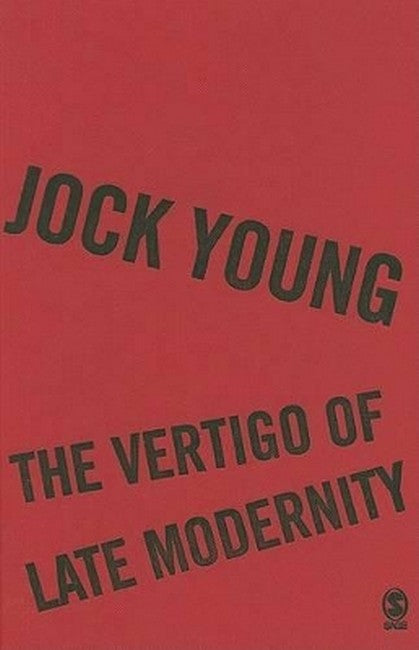Jock Young, one of the foremost criminologists of our time, is Professor of Sociology and Head of the Centre for Criminology at Middlesex University. His work and theories have had a significant influence on the shape of criminology, sociology and politics.
Request Academic Copy
Please copy the ISBN for submitting review copy form
Description
Crossing the Borderline The Disembededness of Everyday Life The Genesis of Othering The Attractions of Hiatus The Vertigo of Late Modernity Turbo-Charged Capitalism Blurring the Binary Vision Bulimia: Not Exclusion But Inclusion/Exclusion Crossing the Borderline: Against the Dual City Thesis The Functional Underclass The Boundaries of Bulimia The Precariousness of Inclusion The Crime and the Narrowing of Differences The Focus Upon the Underclass Globalisation and the Generation of Domestic and Global Discontent The Sociology of Vindictiveness and the Criminology of Transgression Fear of Falling The Change in the Focus of Reward Towards a Criminology of Transgression Humiliation and Rebellion The Satisfactions of Transgression The Humiliation of Exclusion Edgework, Ontological Security and Utopia From Turf War to Real War Hip Hop Across the Borders Chaos and the Coordinates of Order Chaos and Identity in the Twenty First Century The Undermining of the Meritocracy Changes in the Perceived Class Structure The Shift to Identity Politics Antecedents of the Cultural Shift The War Against the Poor The Meta-Humiliation of Poverty The Decline of Work and The Invisible Servant The Declining Centrality of Work? Getting the Poor to Work: The US Experiment Redemption Through Labour Including the Excluded Welfare: From Relief to Irresponsibility Early Morning in Harlem The Invisible Worker The Invisible Servant Entering the Zone of Humiliation Service as a Feudal Relationship The Invisible Poor in a Classless Society Guilt and Middle Class Solipsism Social Inclusion and Redemption through Labour New Labour: New Inclusionism The Welfare State: Not the Solution but the Problem The Will to Win Many's a Slip Twixt Cup and Lip: New Labour's Obsessional Neurosis The Moral Panic Over Teenage Pregnancy Rationality and the Middle Classes From Structure to Agency: Beyond the Weak Thesis Social and Political Exclusion Crossing the Border: To These Wet and Windy Shores The Social Construction of the Immigrant To These Wet and Windy Shores Two Modes of Entry Over Twenty Years Ago: The Riots of 1981 Crime and the Demonisation of the Other The Roots of Othering The Final Phase: The Irony of Assimilation The Roots of the Disturbances The Riots in Bradford, Burnley and Oldham Postscript: The Riots in France 2005 Terrorism and Anti-Terrorism Terrorism: The Banality of Evil Proxy Wars and the Defeat of the Soviet Union Occidentalism The House of Bush and the House of Saudi The Two Contradictions: Inside and Outside the First World Symmetry and Differences The Beatification of Evil The Logic of the West The Photographs from Abu Grahib Love Was All They Had to Set Against Them The London Bombing and the Banality of Evil The Dialectics of Othering and the Problem of Evil The Generation of Anger and the Frustration of Normality The Othering of the Otherer The Summoning Up of Violence Violence and the Metaphor of War Elsewhere: On the D Train to Manhattan Urban Somnambulism: Elsewhere in a Brooklyn Deli The Exclusive Community The Organic Community Othering in the Ardoyne: The Holy Cross School The Fallacy of Privileging Community Enter Virtual Reality: Elsewhere in the East End Stars, Celebrities: Guiding Narratives for a Shifting World The Cronus Effect and Broken Narratives The Deterritorialisation of Community and the Rise of the Virtual Elsewhere in an Elevator: John Jay College, October 2004 The Rise of Multi-Media and the Uninvited Guest From Generalised Other to Generalised Elsewhere From Community to Public Sphere The Community in Late Modern Times Conclusion: Roads to Elsewhere Affirmative and Transformative Inclusion The Politics of Redistribution Towards a New Politics of Inclusion The Politics of Deconstruction Othering and Community The Banishment of Unreason Rationality, the New Media and the Public Sphere The Porous Community Hyperpluralism and the Elusive Other Towards a Politics of Diversity

